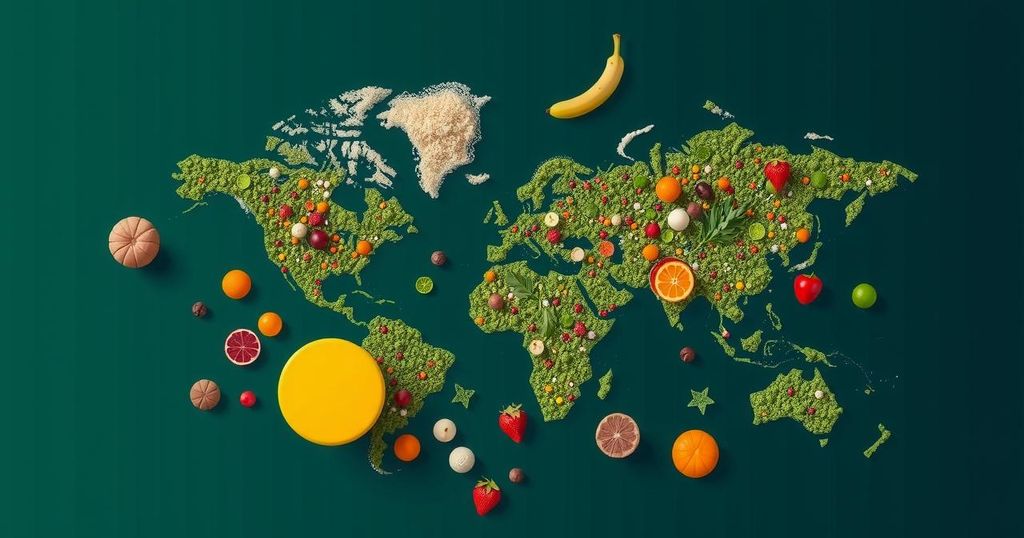Evaluating COP29: Challenges and Opportunities in Food System Transformation

COP29 marks an important moment for addressing food-related emissions, with only 40 of 160 countries likely to present revised climate plans despite strong commitments made at COP28. The conference aims to evaluate the effectiveness of these pledges and the integration of dietary changes into national strategies, highlighting the need for collective action among governments, private sectors, and global coalitions to tackle the urgent challenges of climate change.
World leaders convene in Baku, Azerbaijan, for the 29th annual United Nations Climate Change Conference, COP29. Following last year’s COP28, where over 100 countries addressed greenhouse gas emissions stemming from food production, the conference aims to evaluate the progress of these pledges. Despite the urgent call to reform food systems, which account for approximately one-third of global emissions, many signatory nations have not yet incorporated their commitments into updated Nationally Determined Contributions (NDCs). At COP28, 160 countries endorsed the UAE Declaration on Sustainable Agriculture and Food Systems, committed to integrating agricultural emissions reduction in their climate strategies. However, projections indicate that only about 40 of these nations are likely to present revised NDCs in time for COP30 in Belém, Brazil. Recognizing the slow pace of these updates is pivotal, particularly as experts emphasize that dietary changes are essential for meeting emission reduction targets in Global North countries. One nation signaling progress is the United Kingdom, which cannot achieve its net-zero goals without addressing shifts in dietary habits. The recommendations for the UK include transitioning towards plant-based diets and adopting improved agricultural practices. Yet, altering consumption patterns, particularly concerning meat, remains a contentious challenge within both the UK and the United States. The significance of the food pledges also extends to the private sector, where substantial funds have been allocated towards innovative agricultural practices. Notable commitments from organizations like the Bill and Melinda Gates Foundation and the Bezos Earth Fund underscore the importance of collaborative action at both governmental and non-governmental levels. Amid these discussions, the UN’s Food and Agriculture Organization (FAO) has introduced a three-part roadmap to guide food system transformations alongside climate goals; however, the progress has drawn criticism. Experts have raised concerns over delays in the full publication of the roadmap and have called for clearer guidelines regarding sustainable agricultural practices in the Global South. Despite setbacks with the FAO’s roadmap, progress is being embraced by coalitions such as the Alliance of Champions for Food Systems Transformation (ACF). This alliance aims to initiate dialogue and share best practices among member countries to effectively address their food systems’ challenges. Noteworthy achievements, such as Sierra Leone’s initiative to promote local rice production, illustrate the potential for replicable solutions across different contexts. As the COP29 conference unfolds, debates surrounding food system transformation will continue to shape the future of global climate strategies and highlight the interconnectedness of agricultural practices and climate commitments. The effectiveness of the discussions in Azerbaijan may determine the trajectory of international cooperation and accountability moving forward.
The significance of the COP29 conference lies in its potential to refine global strategies regarding food-related emissions, a crucial aspect given that food systems contribute significantly to climate change. The prior conference, COP28, witnessed commitments from numerous countries aimed at integrating food systems into national climate strategies, thereby setting a transformative agenda for sustainable agriculture. However, the execution of these commitments remains in question, making the ongoing discussions at COP29 imperative for driving meaningful environmental change.
The upcoming discussions at COP29 represent a critical juncture for global climate action, particularly in relation to food systems and emissions reduction. Although initial pledges indicate a collective commitment towards reform, the slow rate of implementation raises concerns over the feasibility of achieving outlined targets. The necessity for cooperation among nations, industry stakeholders, and civil society is paramount to create a cohesive strategy for transforming food systems and addressing climate challenges effectively.
Original Source: impakter.com






